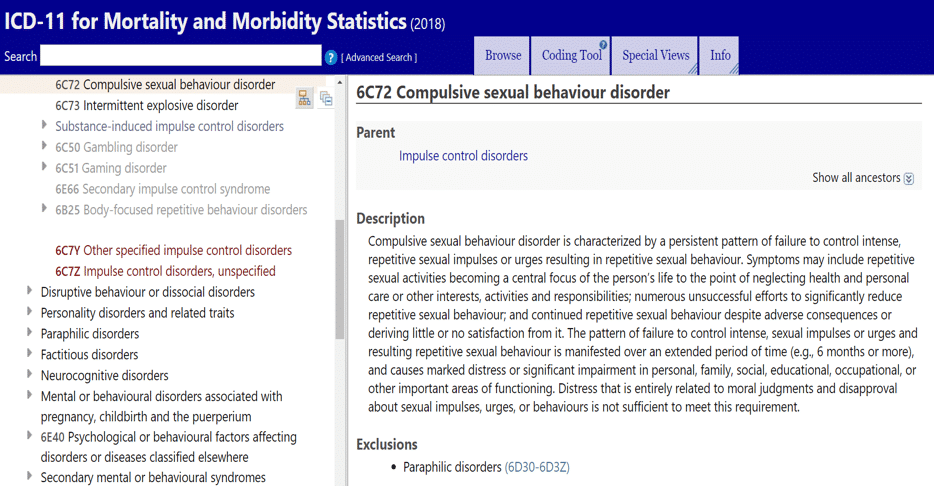The following is an excerpt from an article published by The Reward Foundation
Here are some authoritative notes for journalists and the general public about the new diagnostic category.
On 18th June 2018, the World Health Organization’s authors of the International Classification of Diseases, 11th Revision, put out a press release announcing that the implementation version of the upcoming ICD-11 is now available online. It included Compulsive Sexual Behaviour Disorder (CSBD) for the first time. Despite a few misleading rumours to the contrary, it is untrue that the WHO has rejected “porn addiction” or “sex addiction”. CSBD is an umbrella term that allows diagnoses of both “porn addiction” and “sex addiction” (as well as “hypersexuality” and “out-of-control sexual behaviour”).
- The Press release can be seen on the WHO site here. For convenience, we have reproduced it in full below.
- The ICD-11 press release mentions the addition of gaming as a mental health disorder, and how gender incongruence is now categorized.
- It does not mention another new diagnosis: “Compulsive sexual behaviour disorder”which appears in the “Impulse control disorders”.
- The “Release Notes” under each diagnosis include this statement: “The code structure for the ICD-11 MMS is stable.”
- Here’s the final text of the “Compulsive sexual behavior disorder” diagnosis:

Diagnosis
Compulsive sexual behaviour disorder [6C72], at last offers healthcare professionals a formal, self-evident diagnosis for inability to control sexual behaviour despite negative consequences. Actual implementation of the new codes differs everywhere, but the important thing is that the world’s health experts have agreed that compulsive sexual behaviour merits a diagnosis. It’s a broad umbrella term that can be used for anyone who meets its criteria. “Compulsive sexual behaviour” is also “referred to as sexual addiction or hypersexuality” according to diagnostic expert Jon E. Grant, JD, MD, MPH in Current Psychiatry (February 2018: p.3). The new CSBD diagnosis may also be used to diagnose those with severe internet pornography use-related symptoms.
More than 80% of people with compulsive sexual behaviour report excessive or problematic pornography use.
“Problematic pornography use may represent a prominent manifestation of hypersexuality (also referred to as sexual compulsivity, sexual addiction or excessive sexual behavior in the literature – Kafka, 2010; Karila et al., 2014; Wéry & Billieux, 2017) because in several studies more than 80% of people with hypersexuality have reported excessive/problematic pornography use (Kafka, 2010; Reid et al., 2012)”. (Bőthe et al. 2018:2)
Diagnostic manuals like the WHO’s International Classification of Diseases (ICD-11) and the American Psychiatry Association’s Diagnostic and Statistical Manual of Mental Health (DSM-5) do not label mental health conditions as “Addictions” per se. They prefer “Disorder.”
A “compulsive sexual behaviour” diagnosis arises from a pattern of failure to control intense, sexual impulses or urges, resulting in repetitive sexual behaviour over an extended period of time (e.g., 6 months or more).



